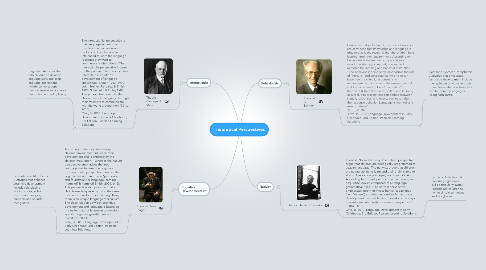
1. Interactionist
1.1. Theorist: Gerorge H. Mead.
1.1.1. The interactionist perspective is that language evolution or development are social and biological. The children are influenced to learn the language because they want to communicate with others. "The interactionist perspective focuses on the primary role of sociocultural interaction in children's development of language knowledge (Bruner, 1983, 1990; John-Steiner, Panofsky, & Smith, 1994; Schieffelin & Ochs, 1986). This perspective contends that children acquire language through their attempts to communicate with the world around them"(Otto, 2010). Otto, B. 2010. Language Development in Early Childhood, 3rd Edition. Pearson Learning Solutions
1.1.1.1. Pragmatic. Activities that help children to develop language skills and social language interactions include conversational practice, repeat back simple information and role playing.
2. Cognitive Developmentalist
2.1. Theorist: Jean Piaget
2.1.1. According to the cognitive theory, children environment influence their development and is enriched by the children maturation. "Whereas the nativist perspective emphasizes the inborn language mechanism, the cognitive developmental perspective assumes that cognitive development is a “prerequisite and foundation for language learning” (Karmiloff & Karmiloff-Smith, 2001, p. 5). This perspective also proposes that a child learns language by using the same mechanisms as for other learning. Thus, there is no unique language mechanism. The close relation between cognitive development and language is based on the belief that, for language to develop, specific cognitive growth must occur first"(Otto,2010). Otto, B. 2010. Language Development in Early Childhood, 3rd Edition. Pearson Learning Solutions.
2.1.1.1. Semantic and Morphemic. Activities that enhance cognitive development include role playing, singing songs, solve puzzles and images, numbers and sounds recognition.
3. Behaviorists
3.1. Theorist: B.F. Skinner
3.1.1. Environmentalists that are known as behaviorists are convinced that knowledge and language is obtained as is the result of that the children have learned from their environment. According to behaviorist is the teacher and parents job to develop a strategy, carry out, analyze and reinforce the learning and behavior instruction. "The behaviorist perspective emphasizes the role of “nurture” and considers learning to occur based on the stimuli, responses, and reinforcements that occur in the environment. A child is considered to be a “blank slate” (Karmiloff & Karmiloff-Smith, 2001), and learning occurs due to associations established between stimuli, responses, and events that occur after the response behavior. Language is learned as a result of these". (Otto, 2010) Otto, B. 2010. Language Development in Early Childhood, 3rd Edition. Pearson Learning Solutions.
3.1.1.1. Semantic,Syntactic, Morphemic Activities that encourage language development include the repletion of words in order to reinforce what was learn this can be done by singing or using flash cards.
4. Nativist
4.1. Theorist: Noam Chomsky
4.1.1. Theorist: Noam Chomsky. The nativist perspective argue that children are biologically programmed to acquire language. The nativists argue that children the natural ability to learn and their brain is able to absorb like a sponge images, words sounds, etc. Acoording to Chomsky all children have a language acquisition device composed of all language grammatical rules. "The nativist perspective emphasizes inborn or innate human capabilities (i.e., “nature”) as being responsible for language development. Linguist Noam Chomsky is the major theorist associated with the nativist perspective" (Otto, 2010) Otto, B. 2010. Language Development in Early Childhood, 3rd Edition. Pearson Learning Solutions.
4.1.1.1. Syntactic Activities hat encourage grammar skills particularly syntax include ask children to write simple sentences and storybooks
